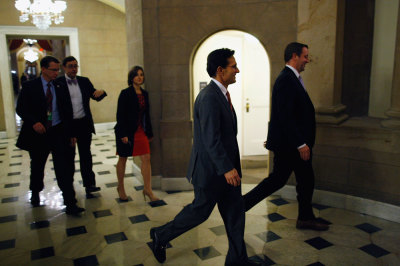Christian Social Justice Leaders Unhappy With Congress as Government Shutdown Looms

Christian leaders have criticized Congress today, arguing that its failure to solve a "completely avoidable budget and financial crises" would leave the country's poorest most at risk.
In a letter released Monday, 33 Christian, Jewish and Muslim leaders expressed deep concern that "shuttering the federal government or defaulting on the nation's financial commitments is likely to reverse our fragile economic recovery, punish the middle class, and deeply harm our most vulnerable neighbors."
They also called on the House of Representatives' most conservative members to rethink the effect of their actions, warning them that "to hold our governance processes and financial credibility hostage to narrow priorities is not only dangerous to the nation's near-term financial well-being," but that "it threatens the very foundations of our democratic process and our capacity to live united in community."
Sojourners CEO, Jim Wallis, said that from a faith-based perspective, the government was failing to fulfill the role God had laid out for it.
"The Bible sees the role of government to protect from evil and promote the good, especially helping and protecting the poorest and most vulnerable people. To protect the common good and the most vulnerable is being denied as the role of government by those who are so eager to push for the brinkmanship of one government crisis and confrontation after another," Wallis said as he participated in a press conference with several of the letter's signatories this morning.
"Those who are eager to shut down the government now and later risk defaulting on the nation's debt need to read their Bibles — at least the ones who claim to be Christian do," he added.
A government shutdown would not only cut services to the domestic poor, but would also reduce international aid, said Rev. John L. McCullough, the president and CEO of Church World Service.
"Internationally, the United States government will not be able to make any new contributions to agencies that deliver food, aid and other services to poor and hungry people around the world. Nor will it be able to respond to new humanitarian emergencies. Over time, hungry people relying on U.S. aid will not receive food and children will not receive inoculation against disease," he said.
McCullough also said that if Congress refused to raise the debt limit in several weeks, the repercussions would be global.
"[There is] every indication that this will have a devastating effect on the American people for themselves and on our nation's ability to perform its international responsibilities," he said.
"If such harmful gamesmanship harms our economy, it will harm many developing economies around the world.," he added.
Rabbi David Saperstein, director of the Religious Action Center of Reform Judaism, said that many of those that would be affected by a government shutdown were "in our pews…in our congregations."
He added that while "the vast number of churches, synagogues and mosques in this country have social services to supplement what the government does," they were only there to "fill in the moral gaps left when the government withdraws from its responsibilities," and that the current situation was unsustainable.
"We are utterly overwhelmed with the demands that seem to be increasing every year, not just because of the economy has problems but because the government is withdrawing," Saperstein said.
Unless Congress passes a spending bill on Monday night, the government will shutdown on Tuesday morning. If the shutdown lasts three to four weeks, its economic impact could be severe. Mark Zandi, chief economist and co-founder of Moody's Analytics, told CNN that it could reduce the United States' GDP by 1.4 percentage points for the quarter.





















